How does one learn the field of AI Psychology?
AI-Psychology: A New Frontier in Understanding Human Cognition

AI Psychology is a fascinating field that merges the principles of artificial intelligence with the intricacies of human psychology. It’s an emerging discipline that holds immense potential to revolutionize how we understand and interact with AI systems.
The field of AI-Psychology is not just about programming machines. It’s about understanding how these machines can learn, think, and even feel in a way that’s akin to human cognition. It’s about exploring the psychological principles that underpin AI, and how these principles can be used to make AI systems more effective, empathetic, and ethically sound.
Learning AI-Psychology is like embarking on a thrilling journey. It’s about delving into the depths of human cognition, and surfacing with insights that can help us build smarter, more intuitive AI systems. It’s about asking tough questions, challenging established norms, and pushing the boundaries of what’s possible with AI.
But why should one learn AI-Psychology? The answer lies in the unique perspective it offers. By combining AI and psychology, we can not only create more advanced AI systems, but also gain a deeper understanding of our own minds. It’s a win-win situation that’s well worth exploring.
So, are you ready to embark on this exciting journey of learning AI-Psychology? Let’s dive in and explore this fascinating field together.
Understanding AI Psychology
AI-Psychology stands at the forefront of technological and psychological convergence, reshaping our comprehension of both artificial intelligence and psychology. Positioned at the crossroads of technology and human cognition, this discipline provides fresh insights into how AI can be harnessed to comprehend and enhance human behavior.
A pivotal facet of AI-Psychology involves the utilization of AI chatbots in therapy, a transformative practice that enhances accessibility and affordability of mental health care. By democratizing therapeutic services, these chatbots cater to a broader audience while simultaneously automating administrative tasks, allowing clinicians to devote more time to their patients.
On the research front, AI-Psychology is charting new territories in understanding human intelligence. Synthetic intelligence, a subset of AI, facilitates novel avenues for studying human cognition. Concurrently, machine learning, a critical component of AI, empowers researchers to analyze vast datasets, extracting insights unattainable through traditional research methods.
However, the integration of AI in psychology is not devoid of challenges. AI tools deployed in healthcare have exhibited discriminatory tendencies, impacting individuals based on their race and disability status. Instances of rogue chatbots disseminating misinformation and engaging in inappropriate behavior, particularly towards minors, have prompted calls for a reassessment of AI research.
Despite these challenges, psychologists remain sanguine about the prospects of AI-Psychology. They assert that with careful consideration and strategic implementation, AI can profoundly influence lives globally. Furthermore, psychologists position themselves as pivotal contributors to uncovering biases in AI systems, ensuring ethical and responsible use.
AI-Psychology emerges as a promising field with enticing opportunities for research and practical application. Positioned to revolutionize our comprehension of human cognition, it holds the potential to reshape the landscape of mental health care delivery. As we delve deeper into this realm, it is imperative to navigate with mindfulness, addressing ethical considerations, and utilizing AI in a manner that serves the greater good of humanity.
Getting Started with AI-Psychology
AI-Psychology is a rapidly growing field that combines artificial intelligence and psychology to gain valuable insights into human cognition and behavior. To embark on this exciting journey, it is essential to develop a strong foundation in both AI and psychology. While a formal degree in both disciplines is not mandatory, a fundamental understanding of their principles is crucial. Numerous online resources, including books, courses, and tutorials, can aid in acquiring the necessary knowledge.
Once a basic understanding is established, the next step is to explore specific applications of AI in psychology. For instance, the utilization of AI chatbots in therapy has revolutionized accessibility and affordability while enhancing interventions and assisting in the training of new clinicians.
On the research front, synthetic intelligence provides innovative approaches to comprehending human intelligence. Machine learning, a subset of AI, enables researchers to analyze vast datasets, extracting insights unattainable through traditional research methods.
However, theoretical knowledge alone is insufficient. Practical experience is equally vital. This may involve engaging in projects that apply AI to psychological issues or participating in research activities.
Initiating a journey into AI-Psychology entails establishing a solid foundation in AI and psychology, exploring specific AI applications in psychology, and gaining practical experience. This journey promises to unveil new perspectives on human cognition and behavior.
Deep Dive into AI-Psychology
AI-Psychology is a rapidly evolving field that reshapes our understanding of both artificial intelligence and psychology. This discipline stands at the intersection of technology and human cognition, offering new insights into leveraging AI to understand and enhance human behavior.
One key aspect of AI-Psychology involves the use of AI chatbots in therapy. These chatbots make therapy more accessible and less expensive, democratizing mental health care and expanding its availability. Additionally, they can automate administrative tasks, allowing clinicians to dedicate more time to their patients.
On the research side, AI-Psychology opens new avenues for understanding human intelligence. Synthetic intelligence, a subset of AI, provides researchers with innovative ways to study human cognition. Machine learning, another key component of AI, enables the analysis of massive amounts of data, yielding insights that traditional research methods cannot match.
However, the integration of AI in psychology is not without challenges. AI tools in health care have shown tendencies to discriminate against individuals based on race and disability status. Instances of rogue chatbots spreading misinformation and engaging in inappropriate behavior have also been reported, leading to calls for a pause in AI research.
Despite these challenges, psychologists remain optimistic about the future of AI-Psychology. They believe that thoughtful and strategic integration of AI can positively impact lives globally. Psychologists are well-positioned to uncover biases in AI systems and ensure their ethical and responsible use.
AI-Psychology is a promising field offering exciting opportunities for research and practice. It has the potential to revolutionize our understanding of human cognition and transform the delivery of mental health care. As we explore this field further, ethical considerations must be paramount to ensure that AI benefits all of humanity.
Challenges in AI-Psychology
AI-Psychology, while promising, faces significant challenges, with ethical implications being a major concern. The use of AI tools in healthcare has revealed instances of discrimination based on race and disability, raising serious questions about the fairness and equity of these applications.
Another issue is the potential for misinformation, as rogue chatbots have been known to spread false information, express inappropriate sentiments, and even engage in inappropriate behavior, particularly targeting minors. Such incidents have prompted calls for a temporary halt to AI research.
The rapid progression of AI technologies is outpacing our understanding of their mechanisms. According to Tom Griffiths, PhD, a professor of psychology and computer science at Princeton University, the capabilities of these systems are advancing faster than our comprehension of their inner workings.
Despite these challenges, psychologists remain optimistic about the future of AI-Psychology. They assert that psychologists are well-equipped to uncover bias in AI systems and ensure their ethical and responsible use.
In navigating the promising yet complex landscape of AI-Psychology, it is crucial to acknowledge and address these challenges thoughtfully and strategically.
Future of AI-Psychology
The future of AI-Psychology is promising and full of potential. As AI continues to evolve, its application in the field of psychology is expanding. Psychologists play a crucial role in developing and deploying AI software and technologies, ranging from therapeutic chatbots to facial-recognition systems. They are actively contributing to literature on human-computer interaction, digital therapeutics, and the ethics of automation.
AI is significantly transforming every aspect of psychology. In psychological practice, AI chatbots enhance accessibility and affordability of therapy. AI tools also contribute to improved interventions, automation of administrative tasks, and training support for new clinicians. On the research front, synthetic intelligence provides novel perspectives on understanding human intelligence, while machine learning facilitates insights from vast data sets.
However, the rapid advancement of AI technologies surpasses our comprehension of their workings. According to Tom Griffiths, PhD, a professor of psychology and computer science at Princeton University, the progress is driven by the capacities of these systems, outpacing our understanding of their mechanisms.
Despite its potential, AI in healthcare has raised concerns, with instances of discrimination based on race and disability. Rogue chatbots have disseminated misinformation, expressed inappropriate sentiments, and engaged in misconduct, leading to calls for a pause in AI research in March 2023.
The future of AI-Psychology holds great promise, yet challenges persist. As we navigate this evolving field, it is essential to remain mindful of these challenges and strive to utilize AI in ways that benefit all of humanity.
- Instagram Profile Analyzer: Unleash the Power of Free AI Analytics
- How to do the AI image trend on Instagram
- How do you make an AI DP on Instagram?
FAQ
How to use AI for psychology?
AI can be used in psychology in various ways. It can be used to develop therapeutic chatbots, automate administrative tasks, aid in training new clinicians, and provide new ways to understand human intelligence.
What is AI in the field of psychology?
AI in psychology, often referred to as AI-Psychology, is an emerging field that combines the principles of artificial intelligence with the intricacies of human psychology. It’s about understanding how AI systems can learn, think, and even feel in a way that’s akin to human cognition.
Will AI replace psychology?
While AI is transforming many aspects of psychology, it is unlikely to replace the field entirely. The human touch and professional judgment that psychologists provide are irreplaceable. However, AI can augment the work of psychologists and make certain processes more efficient.
How will AI affect psychology jobs?
AI is likely to change the nature of some jobs in psychology, but it’s also creating new opportunities. For instance, psychologists are needed to develop and oversee AI applications in therapy and research.
Is there any AI psychologist?
While there are no AI systems that can fully replicate the role of a psychologist, there are AI applications, like therapeutic chatbots, that can perform certain tasks traditionally done by psychologists.
What is the future of AI in psychology?
The future of AI in psychology is promising. As AI continues to evolve, so too does its application in psychology. Psychologists are helping develop and deploy AI software and technologies, and are amassing a robust literature on human-computer interaction, digital therapeutics, and the ethics of automation.
How to study AI for beginners?
Beginners can start studying AI by taking online courses, reading books on the subject, and working on small projects. It’s important to have a solid foundation in both AI and the specific field you’re interested in, such as psychology.
Can I self study AI?
Yes, you can self-study AI. There are numerous resources available online, including tutorials, courses, and books that can help you learn AI at your own pace.
Will AI take over psychiatry?
While AI is being used in psychiatry, it is unlikely to take over the field. AI can assist in diagnosing and treating mental health disorders, but the human touch and professional judgment that psychiatrists provide are irreplaceable.
Conclusion: The Journey of Learning AI-Psychology
The journey of learning AI-Psychology is a thrilling exploration into the intersection of artificial intelligence and human cognition. Despite the challenges, the field holds immense potential to revolutionize our understanding of human behavior and the way we interact with AI systems.
As we continue to delve deeper into this fascinating discipline, we must remain mindful of the ethical considerations and strive to use AI in a way that benefits all of humanity. The future of AI-Psychology is bright, and the journey of learning is just beginning. So, let’s embrace the journey and explore the exciting world of AI-Psychology together.


![Cold Sore Healer [Medical and Home Methods] - 13 Cold Sore Healer](https://techmodena.com/wp-content/uploads/2022/12/Cold-Sore-Healer-Medical-and-Home-Methods-390x220.jpg)



